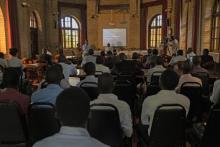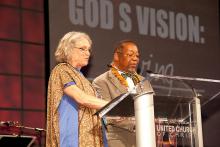Human Rights

t’s also one of the most divisive political issues on the Hill right now. Here’s why: The notion of "fast tracking" trade deals with almost no congressional oversight has led to the creation of odd alliances — putting the Democrats and Tea Party in one camp (against), and the Republicans and Obama Administration (for) in another. Pro-business Republicans are long time supporters of free trade, while members of the Tea Party are against most anything that would allow the President to usurp legislative authority. As for Democrats, they argue that the TPP would allow multinational corporations to undermine labor safeguards, civil rights, environmental protection and healthcare, and derail urgent efforts at fighting climate change. Organizations typically aligned with President Obama are against him here: labor unions, environmental groups, and even traditionally non-political groups have fought hard against Fast Track and the TPP.
Indeed, the potential harm from the trade deal seems to leave few interest groups untouched. To provide just a few examples, Doctors Without Borders has called the TPP the "worst trade deal ever," claiming that it will cause millions to lose access to life-saving medicines; left-leaning Global Exchange has pointed to the increasing number of sweatshops such a framework would lead to; and the digital rights organization Electronic Frontier Foundation has expressed its belief that the TPP would put overly restrictive controls on the internet. And we’ve already seen our political leaders weaken standards for protection against human trafficking and child labor should the trade deal move forward.
These are all compelling arguments, and they are ones faith groups are making as well.

When I reached high school and started dating, my relatives had a lot of questions: "This girl you’re going to the movies with: Is she Catholic? Slovak? What’s her family’s last name? What does her father do for a living?"
She had to be Catholic, of course. Preferably Slovak. If not, some other nearby nationality. Anything less would get disapproving comments. Those questions may sound odd now, but they mattered back then. The Catholic Church had only recently concluded Vatican II, which tried to bridge centuries of animosity between churches. Accepting Protestants as equals was something new. And many of the immigrants in my neighborhood were trying to preserve the culture and traditions that they brought from Europe. They were afraid of losing their heritage in the new land.
For them, traditional marriage meant choosing someone from the same faith, the same ethnic background. Simply put, they were afraid. Terrified, actually. They feared that if marriage changed, their world would fall apart.
That's why to so many people, my relationship wasn’t about finding someone who fit me — it was more about me finding someone who fit them.

By the end of June — and as early as next week — the Supreme Court is expected to rule on the legality of gay marriage nationwide. In a pre-emptive move to refocus narrative and legislative control at the state level, two states this week enacted laws designed to protect religious objection to same-sex couples. Here's how.

This is awkward.
In a June 5 Facebook post, Franklin Graham suggested that it’s time to “fight the tide of moral decay that is being crammed down our throats by big business, the media, and the gay & lesbian community. ...This is one way we as Christians can speak out — we have the power of choice. ...Let’s just stop doing business with those who promote sin and stand against Almighty God’s laws and His standards," Franklin wrote on Facebook.
But Franklin’s popular autobiography, Rebel With a Cause, was published by Thomas Nelson, a Christian publishing company. Thomas Nelson’s publicity is handled by a company called Rogers & Cowan. One of the largest public relations firms in the world, Rogers & Cowan also is the publicist for ...
... Caitlyn Jenner.
Whoops.

After decades of “bridge building” between the LGBTQ community and those who identify as evangelicals in opposition to full LGBTQ inclusion, Tony Campolo spoke out in favor of both full inclusion of same-sex couples in the church, as well as for marriage equality.
“It has taken countless hours of prayer, study, conversation and emotional turmoil to bring me to the place where I am finally ready to call for the full acceptance of Christian gay couples into the Church,” he wrote on his blog on June 8.


A growing number of LGBT Ugandans are fleeing to neighboring Kenya to escape violence and persecution, a Ugandan Catholic priest says.
People are beaten, raped, evicted, and dismissed from their jobs because of their sexual identity or orientation, the Rev. Anthony Musaala said during a talk at All Saints Catholic Church as part of a monthlong visit to the United States and Canada.
Even associating with or advocating for LGBT people may spur discrimination, he said.

The binaries simply don’t work, and when we try to cling to them we feel like the universe is crumbling around us when we see evidence to the contrary, and especially when we sense it within ourselves.
Welcome to the world, Caitlyn. You are beautiful.

More than 55,000 people have signed a petition calling for Cardinal George Pell to return to his native Australia and face a government commission on child sex abuse, after allegations that he tried to bribe the victim of a pedophile priest.
Addressed to Pope Francis, the Change.org petition calls for Pell — the Vatican’s financial chief and former archbishop of Sydney — to answer questions from Australia’s Royal Commission into Institutional Responses to Child Sexual Abuse.

Hundreds of thousands of Rohingya Muslims live in squalor in Myanmar’s western Rakhine State. That number has been falling fast as thousands flee by land and sea in search of better lives and basic survival. Here’s a look at who the Rohingyas are and why they’re leaving Myanmar in droves.

I WAS just 15, and as the eldest I had to do something to help my family. When the captain of our local army squadron introduced a recruiter to my parents, I was ready to go anywhere. He made it sound so nice! I would go to Japan and work in a famous hotel as a professional dancer. It would mean lots of money to send home to my poor family in the Philippines. Of course, I would have to go to Manila first to be trained, and I would have to change my name to fit my new life.

Despite much gloom and doom, there were a few silver linings in the report. Religious freedom and harmony have improved in Cyprus, resulting in greater access to houses of worship across the Green Line separating north from south. Nigeria witnessed its first peaceful democratic transfer of power earlier this year when Muslim northerner Muhammadu Buhari ousted Christian southerner Jonathan Goodluck at the polls. And Sri Lanka’s new government has taken positive steps to promote religious freedom and unity in the face of violent Buddhist nationalism.

A cake shop has been in the news lately. Sweet Cakes in Oregon made national headlines when a same-sex couple levied a lawsuit against it for refusal of service.
This is where the story gets interesting.
In the state of Oregon, same-sex marriages are legal. The couple went to the cake shop to order a wedding cake for their upcoming union. The cake shop said no on the ground of their religious beliefs — or as they put it, "standing on the word of God."
This sparked raging debates on whether a business has the legal right to discriminate solely based on their religious beliefs. Investigations have been held, feelings have been hurt, Scripture has been quoted and misquoted, and Facebook rants have been posted.
Franklin Graham has now added his two cents, starting an online donation campaign to help with the bakery’s looming legal fines — its actions violated the Oregon Equality Act of 2007, which states that persons cannot be denied service based on their sexual orientation.
In Graham's plea he stated that the shop owners were being "persecuted" for their religious beliefs. But this is not called persecution — this is called being held to a standard of decency, tolerance, and love. These are tenants Christ wanted his followers to imitate.
Most Christians would throw a fit if a bakery, store, or other business denied them service because of the owner’s religious beliefs. There would be lawyers on the phone, news crews outside the establishment, and more Facebook rants about how our society is slowing losing its “Christian heritage.”
Isn’t interesting that some Christians are ok with denial of service to this same-sex couple in the name of business/religious liberty, but wouldn’t want to the tables to be turned on them?
Just because 78 percent of Americans identify as Christian does not mean we all see eye to eye. But is Christianity truly “persecuted” if it comprises more than three out of every four people in a society?
What people are mad about is that their version of Christianity is not the norm or the most accepted one anymore. Many Christians see same-sex marriage as a nonissue. Many church denominations have had intense and productive conversations about homosexuality in the church. Some are still divided. Many people, churches, and denominations need to hold more conversations, prayer, and discernment. The United States and the Church have a long way to go until full equality is achieved.
The issue with regards to this bakery is not their religious liberty, Christian persecution, or even the right to practice one’s faith. It is the notion that discrimination is wrong.
In this war of words many are not seeing the real issue, which is this — discrimination, even under the guise of religion, is still discrimination, and it is against the most basic and fundamental teachings of Jesus Christ.

A Mormon man and woman in a mixed-orientation marriage are objecting to their inclusion in a U.S. Supreme Court case filing because it argues that legalized gay marriage would demean marriages like theirs.
Josh and Lolly Weed’s names and statements are referenced in a “friend of the court” brief ahead of the April 28 arguments in a consolidated 6th Circuit Court of Appeals case, which many expect will legalize gay marriage nationwide.
The brief was filed April 3 on behalf of couples in mixed-orientation marriages — unions in which one partner is gay and the other is not — who oppose marriage equality.
The Weeds told The Salt Lake Tribune on April 14 they didn’t consent to be included in the filing, nor do they share its view.
Among the filing’s arguments: Constitutionally mandated same-sex marriages can exist only by “erasing, marginalizing and demeaning the same-sex attracted who live in man-woman marriages” and would send a “harmful message that it is impossible, unnatural, and dangerous for the same-sex attracted to marry members of the opposite sex.”
“What does that have to do with us at all?” asked Josh Weed, an openly gay man who has been married to a woman for 12 years.
“I feel no devaluation of my marriage status by having marriage equality.”
The Weeds, of Washington state, became the public face of Mormon mixed-orientation marriage in 2012, when they posted their story on Josh’s blog, joshweed.com. They do not advocate mixed-orientation marriages for others.
“My wife and I support marriage equality,” Josh Weed said.

In 1990, my father and pregnant mother packed up their life in suburban Illinois, bundled their four young children (including me) onto a plane, and landed in Romania to teach on a grant at the University of Bucharest.
The country was in the throes of revolution following the execution of ousted dictator Nicolae Ceaușescu, and the transfer of power was by no means tidy or complete. The Securitate — one of the most brutal secret police forces in the world — proved difficult to shut down. All our neighbors operated under the assumption that their every move continued to be watched (one friend had taken apart his typewriter by hand and hid it so he could answer honestly that he did not keep a typewriter in the house). Being American, my parents were told to expect our apartment to be bugged.
Freedom had come, but the systems of omnipresent control proved psychologically hard to shake.
The specter of surveillance is an insidious tool. In the 1790s, British philosoper Jeremy Bentham developed a centralized prison model called the panopticon, in which every occupant is visible to a single guard. Most models, since adapted by prisons and schools around the world, leave open the possibility that there is no supervisor watching after all. Whether there is isn't the point — the mere promise of one is enough to coerce significant behavior change. Being constantly observable is the trap.
These days, Americans don’t need a formative year spent in post-soviet Romania to feel uneasy about omnipresent surveillance. Edward Snowden’s revelations of massive secret surveillance programs operating under the NSA, with enormous access to private data from citizens not suspected of terrorism or criminal wrongdoing, rocked our understandings of data privacy and civil liberty. Now, as then, it’s reasonable to worry that we’re being watched.


IMMANUEL KANT has been on my mind as I’ve followed the national response to recent measles outbreaks. Kant, a German philosopher, emphasized the danger of a temptation we are all vulnerable to—the temptation to make special exceptions for ourselves. The person who acts against principles that she thinks others ought to follow becomes a kind of moral “free-rider,” attempting to benefit from public moral order without contributing to it.
The spread of disease among the intentionally unvaccinated highlights the free-rider problem faced by parents who seek exemption from vaccination.
Some people believe that leaving their children unvaccinated (or under-vaccinated) minimizes their children’s health risks. If everyone around them has been vaccinated, their risk of infection is indeed low. But when too many people decide to forego vaccination, “herd immunity” is lost and disease outbreaks occur.

Indiana Gov. Mike Pence defended his state’s new religious freedom law March 29 while refusing to say if it would allow discrimination against gays and lesbians.
Facing a rising tide of criticism and business boycotts against his state, Pence said he would consider a second law that “amplifies and clarifies” the first one but added, “We’re not going to change the law.”
“We have suffered under this avalanche for the last several days of condemnation, and it’s completely baseless,” Pence said on ABC’s This Week.
“This isn’t about disputes between individuals. It’s about government overreach. I’m working hard to clarify this. We’re reaching out to business leaders.”
The law Pence signed Thursday prohibits state or local governments from substantially burdening a person’s ability to exercise their religion — unless the government can show that it has a compelling interest and that the action is the least restrictive way to achieve it. It takes effect July 1.
On March 28, thousands of people gathered in downtown Indianapolis to protest the law that critics say could allow discrimination against gays and lesbians. And business leaders have balked, led by Indianapolis-based Angie’s List, which put off a planned $40 million expansion.
The governor’s effort to quell the firestorm over the state’s religious freedom restoration act did little to mollify gay rights organizations convinced that the law would allow businesses to refuse to serve gays and lesbians.
“Governor Pence’s calls for a clarification of this destructive bill are phony unless the legislation guarantees explicit non-discrimination protections for LGBT Hoosiers and includes a clear civil rights carve-out,” said Chad Griffin, president of the Human Rights Campaign.
White House press secretary Josh Earnest said on ABC that the law “appears to legitimize discrimination” despite Pence’s claims that it is modeled after laws signed by President Clinton at the federal level in 1993 and supported by then-state senator Barack Obama in Illinois.
“If you have to go back two decades to try to justify something you are doing today, it may raise some questions about the wisdom of what you’re doing,” Earnest said.
“Governor Pence is in damage control mode this morning, and he’s got some damage to fix.”

Among Christians who practice Lent, the Holy Week timeline is a time for reflection on the practices of Jesus in his last days prior to his death. Reflecting on Holy Week can be a spiritual practice to consider the place of those practices in our own lives. According to the Gospel of Mark, Jesus followed his triumphal entry into Jerusalem on Palm Sunday by taking time on Monday during that week to publically drive out and speak against temple-based financial exploitation.
The cleansing of the Temple is documented in all four gospels. Three place it during Holy Week. Scholars have written that this event occurred in the area of the Temple known as “Solomon’s Porch,” which was open to Jewish and Gentile worshippers alike. It was a marketplace for the purchase of items needed for worship — pilgrims attending Passover celebration, unfamiliar with Jerusalem, may have purchased sacrificial animals at a higher price than elsewhere in the city. Poorer individuals, unable to afford a lamb, may have purchased overpriced sacrificial doves. Foreign currency, forbidden inside the Temple, could be exchanged, for a fee, for local currency to pay the annual Temple tax.
It has been argued that the High Priest may have received a percentage of the profit from the money changers and merchants, so their removal from the Temple would have caused a financial loss to those in power. It has been argued that the noisy marketplace atmosphere may have been disruptive to the atmosphere of worship. The text is unclear about the exact nature of the sin. However, it is clear that when Jesus saw the market, he became angry and turned over tables, driving out those exploiting the people and publicly calling them “robbers.”
Whatever the exact nature of the financial sin was that was occurring in the Temple at the time, the text in Mark suggests that after this act of clearing the Temple, those in power began to earnestly plot Jesus’ arrest and death. Jesus’ opposition to the money changers was directly related to his arrest and crucifixion later in the same week.
While I would like to identify with Jesus in this story, I realize I am more often in the position of the watching crowd. Or am I the merchant, lining my own pockets with the misfortune of others and making profits or receiving benefits from practices that exploit?

Though the Christian Church (Disciples of Christ) has made Indianapolis its headquarters for nearly a century, the denomination is considering pulling its next biennial convention out of Indiana over a new state law that allows businesses to turn away gay customers.
Gov. Mike Pence signed the Religious Freedom Restoration Act on March 26, the day after receiving a letter from church leaders pleading with him to veto it and threatening to move their 2017 General Assembly outside the state.
The bill protects business owners who invoke their religious beliefs to deny service to LGBT customers. A photographer, for example, may refuse to take pictures of a lesbian wedding on the grounds that his faith rejects gay marriage.
“Purportedly a matter of religious freedom, we find RFRA contrary to the values of our faith — as well as to our national and Hoosier values,” stated the letter, which was signed by Sharon E. Watkins, the church’s general minister and president, as well as the leaders of its overseas and domestic missions.
“As a Christian church, we are particularly sensitive to the values of the One we follow — one who sat at table with people from all walks of life, and loved them all.”
The General Assembly will bring more than 6,000 church members to whatever U.S. city the church decides upon and is expected to generate about $5 million in tourism dollars. After Pence signed the law, ministry leaders said they are weighing the costs of moving not only the General Assembly, but smaller meetings — such as the more frequent gatherings of the 125-member board of directors — which most often meets in Indianapolis.
Associate General Minister and Vice President Todd Adams said the church’s board will decide whether to yank the General Assembly from Indianapolis at its next meeting, which begins on April 10.
Other businesses and conventions, including Gen Con, the world’s largest gaming convention, which brings an estimated $50 million to the state each year, have also threatened to find another place to hold their events.